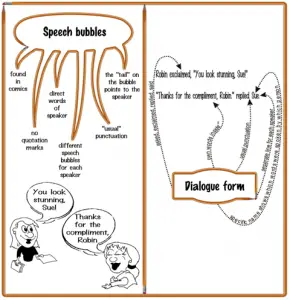 Activity on p. 92 from Pragmatics and Discouse by Joan Cutting.
Activity on p. 92 from Pragmatics and Discouse by Joan Cutting.
a) Direct directive speech acts:
– spoken by others
Context: ‘teacher enters the classroom’
– one student says to the class: ‘Please, stand up!’ (command)
Context: ‘on crowded stairs’
– move (command)
Context: ‘my former students peeping throw the window of my office’
– Look, Teacher Mihnea! (showing surprise, attracting attention to a specific point)
– I have addressed
Context: ‘in the classroom, teaching a Halloween lesson’
– sit down (command)
– listen to the tape (command)
– write in your notebooks (command)
– look at the whiteboard (command)
– stick this on the board (command)
– turn off this fan (command)
– give me a marker (command)
– have a look on the first page (command)
– read the text silently (command)
– write your friends’ names (command)
– turn the page (command)
– answer the questions (command)
– match the words with their definition (command)
– finish the story at home (command)
– use the words in the box (command)
– please, be quiet (command)
– stop talking (command)
– pay attention (command)
– give me the blue book (command)
Context: ‘one hour before my lesson, on the phone with my Thai assistant”
– Where are my worksheets? (inquiry)
Context: ‘a student asks me to write a letter of recommendation’
– Come back after lunch. (invitation)
– addressed to me
Context: ‘in the middle of the lesson, in the classroom’
– Teacher, may I go out please? (request)
– May I come in please? (request)
Context: ‘in my office, a student with a paper in her hand, kneels down’
– Please write this letter of recommendation for me. (request)
Context: ‘in my office, a teacher’
– Can you write for me a quizz? (request)
– Can you give it to me tomorrow? (request)
Context: ‘My Thai assistant, on the corridors’
– I will give you the magazines next week. (promise)
Indirect directive speech acts:
– spoken by others
Context: ‘deskmate to a late student’
– ‘Teacher said we have to read this and then answer the questions.’
– I have addressed
Context: ‘on the corridors, to my Thai assistant’
– ‘Gloria said that she is going to buy for me blue tac, and a big map of Thailand.’
– ‘And she also said that the school can buy for me Nation Junior and Student Weekly’
– addressed to me
Context: ‘a fellow teacher in my office’
– ‘James told me that you have some extra copies.’
Written instructions:
Context: ‘at a petrol station’
– sign ‘no smoking’ and ‘no fire’
Context: ‘at a TESCO LOTUS parking lot’
– sign ‘parking for motorbikes and bicycles’
Context: ‘at a TESCO LOTUS WC’
– sign ‘no littering’
b) I addressed, had been addressed and heard more direct speech acts than indirect speech acts.
c) Most of the indirect directives used indirect speech. The reported verbs were ‘said’ and ‘told’.
d) The context influences the directness very much. In my case, in the classroom, most the directives were commands that the students had to obey.
e) In every day speech, people use direct speech more than they use indirect speech. The reason is that direct speech is an element of verbal conversation, as opposed to indirect speech which is an element of the written form.
